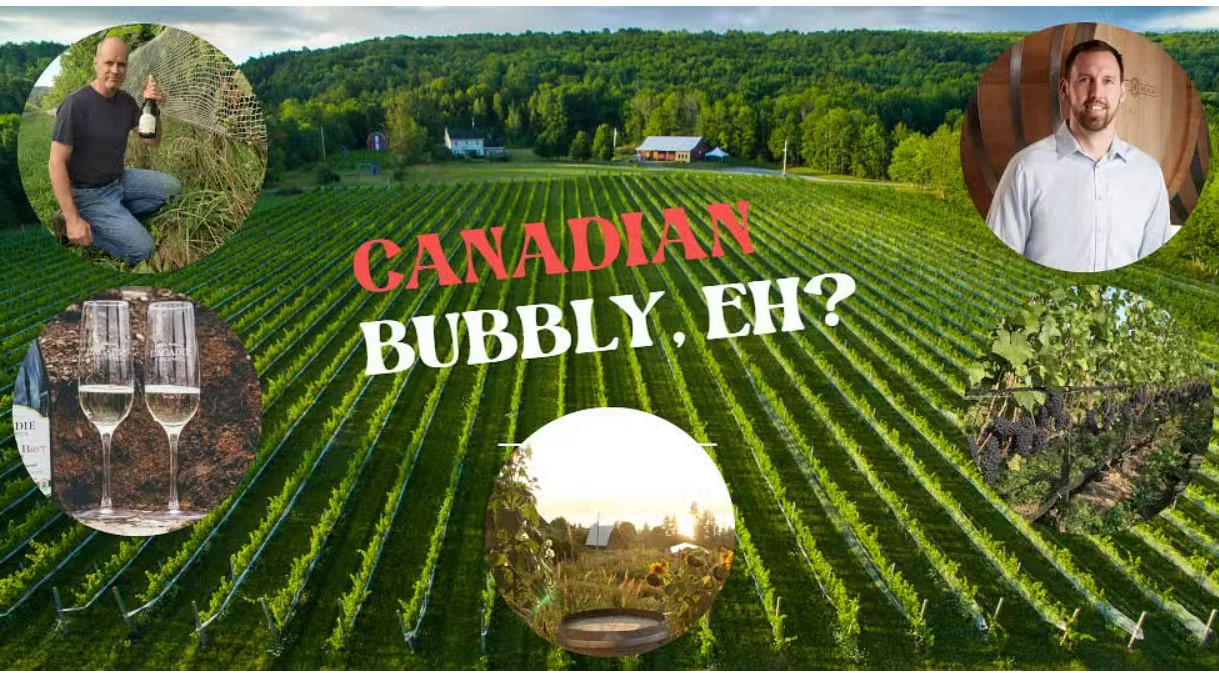L'Acadie Vineyards Blog
Welcome to the L'Acadie Vineyards blog and winery news
Earth Day- be a part of the solution
Earth Day: April 22, 2023
Atmospheric CO2: 420ppm
We all want to be part of the solution to help Mother Earth. If you were born in the 60’s, atmospheric CO2 was 320ppm, now it’s 420ppm. We are on the wrong path, as NASA describes in this dramatic graph.
L'Acadie Vineyards makes organic and vegan wines, from soil to glass, for people who care. Delicious healthful wine that you'll be proud to serve for memorable occasions knowing that you are part of the solution.
It's simple to get our wines to be a part of the solution today,
- Choose our organic wine – look for the Canada Organic symbol on the bottle, every one of our wines has it. It means rigorous inspections, transparency and traceability
- Buy at wine bars and restaurants, private wine stores, online, direct from our Gaspereau winery, and NSLC
- Enjoy our delicious organic wine with friends and family along with organic food. Share your experience to amplify your impact for change.

Here is the difference you’ll be making. When you purchase organic food like our organic vegan wine you are contributing to a greener planet.
- Grapes are one of the dirty dozen – 12 fruits and vegetables that are heavily sprayed with pesticides and you can avoid those residual pesticides in your wine by buying organic.
- Pesticides can contaminate groundwater and poison your community’s drinking water.
- Our vegan wines certified by Biocyclic Vegan International don’t use animal manures in growing grapes or the many animal ingredients commonly used for winemaking. Large scale livestock farming has been proven to generate 14% of greenhouse gases.
Make a difference today. Be a part of the solution for Mother Earth and enjoy delicious wine today. We've done the hard work so it's easier for you.
Order here
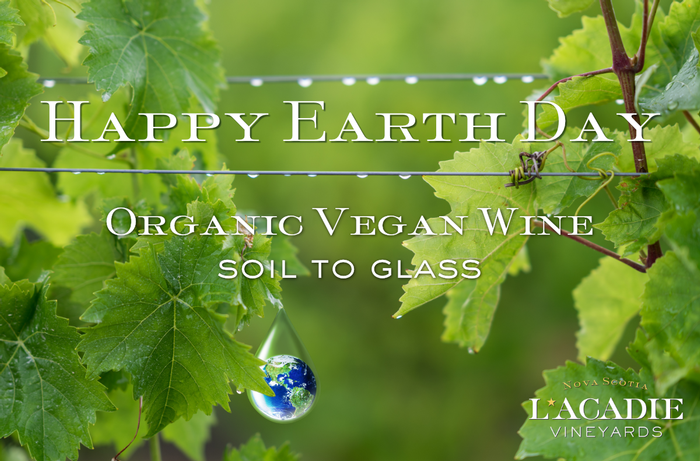
Climate Change and Nova Scotia sparkling
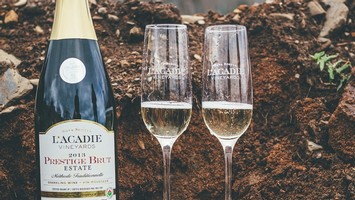
I was recently asked to sit on a panel about the effects of climate change to the Nova Scotia wine industry. This request adds to a significant increase in focus lately - there are new research proposals on how vineyards can be more resilience, trade conferences like Tasting Climate Change, and of course much research into the February Polar Vortex event...which interestingly happened after the panel topic was chosen.
I plan to discuss organic farming and the benefits of resilience. And then share data and trends of grape maturity for sparkling wine.
Organic Viticulture
Organic viticulture, the practice of growing grapes without synthetic chemicals, can make a vineyard more resilient to climate change in several ways:
- Improved soil health: Organic viticulture relies on the use of natural fertilizers and soil amendments, which can improve soil structure and water-holding capacity. This means that the soil can retain more moisture during droughts and absorb excess water during heavy rains, reducing erosion and soil compaction.
- Improved mycorrhizal fungi networks: living soils are optimized in an organic system – pesticides, synthetic fertilizers and excessive tillage reduce populations. The expanded influence by this network to the root zone allows vines to source more nutrients to have higher tissue sugars for cold hardiness and disease resistance.
- Biodiversity: Organic vineyards typically encourage biodiversity by providing habitat for insects and other wildlife. This can help to create a more resilient ecosystem that is better able to adapt to changes in climate and weather patterns.
- Reduced carbon footprint: Organic viticulture often involves the use of more sustainable practices, such as cover cropping, reduced tillage, and the use of natural pest management strategies. These practices can help to reduce the carbon footprint of the vineyard, which can contribute to mitigating the effects of climate change.
- Resilient grape varieties: Organic viticulture may favor grape varieties that are better adapted to the local climate and soil conditions. This can result in a more diverse and resilient vineyard that is better able to withstand extreme weather events such as drought, heatwaves, or cold snaps.
Overall, organic viticulture can help to create a more sustainable and resilient vineyard ecosystem, which is better equipped to adapt to the challenges of climate change.
Sparkling Mecca
The 2010 growing season was the first time I felt heat that reminded me of my previous sparkling career in the Okanagan Valley of British Columbia. We had moved back to Pauline's home province in 2004 to make sparkling wine in a better climate for the style. Coincidently, that year corresponds closely to what researchers in our region identify as the start of the effects of climate change, and it marked our second vintage to earn medals at Effervescents du Monde in France.
Read more about the contrasts of making sparkling wine in the two regions.
/blog/Vintage-2022-and-Climate-Change-in-Nova-Scotia
Moderate sugars, acid retention and brown lignified (ripe) seeds are the characteristics of a world-class sparkling region, and Nova Scotia has it! As it gets warmer, though, we have been watching acidity more closely and adjusting pick dates to keep optimal freshness. See below for data from 14 years of harvesting Prestige Brut Estate from the same block showing that we have been not only maintaining freshness but also slightly trending higher acidity.
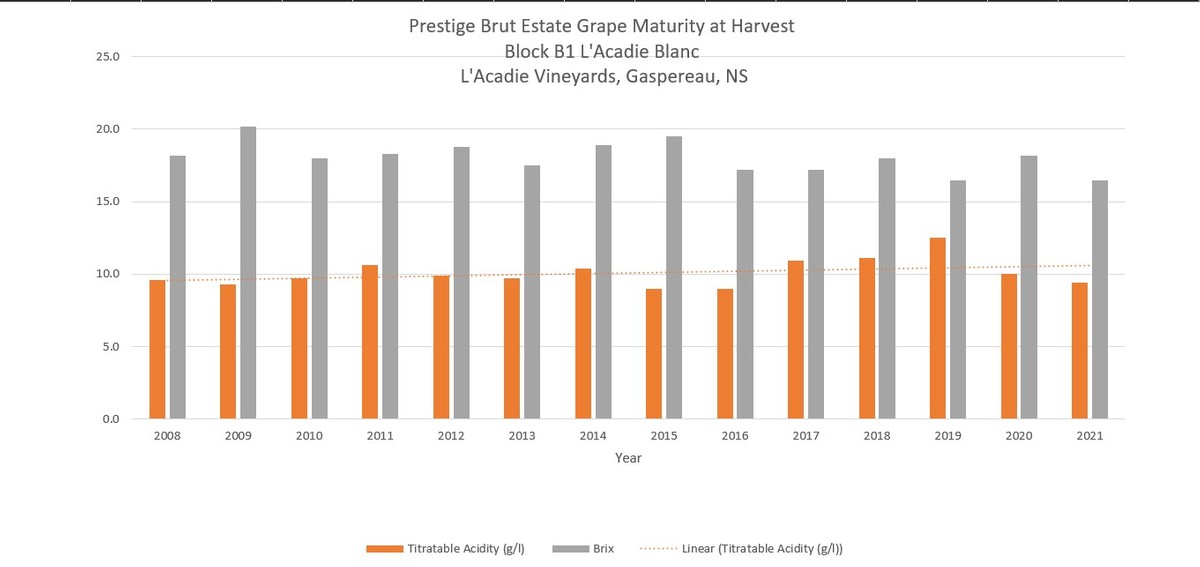
Other strategies to retain freshness in a warming climate is to prune for more crop....more grapes per vine tends to increase acidity and lower sugars at harvest. There are limits though. Champagne regulations usually have an upper limit of 10-12 tonnes per hectare, approximately 4-5 tonnes per acre, and many growers crop even higher and sell the unusable excess to distillers. But at these crop levels and higher there can be impacts on flavour and, to a lesser degree, possible nutrient deficiencies in the juice causing fermentation problems. Remember we are still striving for ripeness, and what works in Champagne might not work here in Nova Scotia. Most of the vintages listed above were cropped at 3-4 tonnes per acre, which matched our terroir of rocky well-drained soil with about 8 inches of humus-rich top soil in the block where we grow Prestige Brut Estate. And all years had brown seeds, ripeness!
Transparency and Sustainability: the benefits of choosing certified organic and vegan wines
Transparency and Sustainability: the benefits of choosing certified organic and vegan wines
Welcome to our blog! We are passionate about certified organic and Biocyclic Vegan wines, and committed to sustainability and transparency in everything we do. Discover why our award-winning wines are a must-try for health-conscious wine lovers.
Ingredients
Transparency is a cornerstone of certified organic and certified Biocyclic Vegan wines, backed by rigorous inspections of grape growing and winemaking, to inform you of what is not in your wine. The Canadian Organic Standard prohibits genetically modified ingredients, synthetic pesticides and synthetic fertilizers, and the Biocyclic Vegan International Standard prohibits animal inputs in the vineyard and winemaking. This effectively eliminates many common ingredients and since nutritional information and ingredient declarations are not required for wines, certified organic vegan wines are your only guarantee of what wasn’t added to them.
The certification logos on labels are your guide to choose wisely. You can also view our list of organic wines at our certifier’s site,

Health
Lower alcohol in cool climate wines offers a health advantage, another benefit of buying local. Add the health benefits of organic wines and you have a winning combination! You avoid synthetic pesticide residues - yes, every spray in the vineyard makes it into your glass, and preservatives such as potassium sorbate. Sulfite is naturally occurring, produced by yeast, and organic winemakers can only adjust sulfite levels to half the maximum in federal standards.
Alcohol and Wine - new Canadian alcohol consumption recommendations
Social Change and Environment
Biocyclic Vegan standards start in the vineyard compared to other vegan certifications that just focus on winemaking. These wines are vegan from soil to glass, and not using animal manures is a clear message to oppose conventional livestock practices. Composted grape pomace, left over after pressing, is alternatively used to create a humus-rich soil teeming with beneficial microbes - a living soil that supports vine health.
Cover crops and no-till practices, a pillar of organic agriculture, promote living soils and better nutrients, and mounting information indicates that carbon-holding benefits can lessen global warming.
Water and air quality benefits from organic practices are well proven. Nanotechnology is prohibited because these engineered substances in food and packaging can add to the problems of plastics in our water systems and our health..
~~In vino veritus
February Newsletter
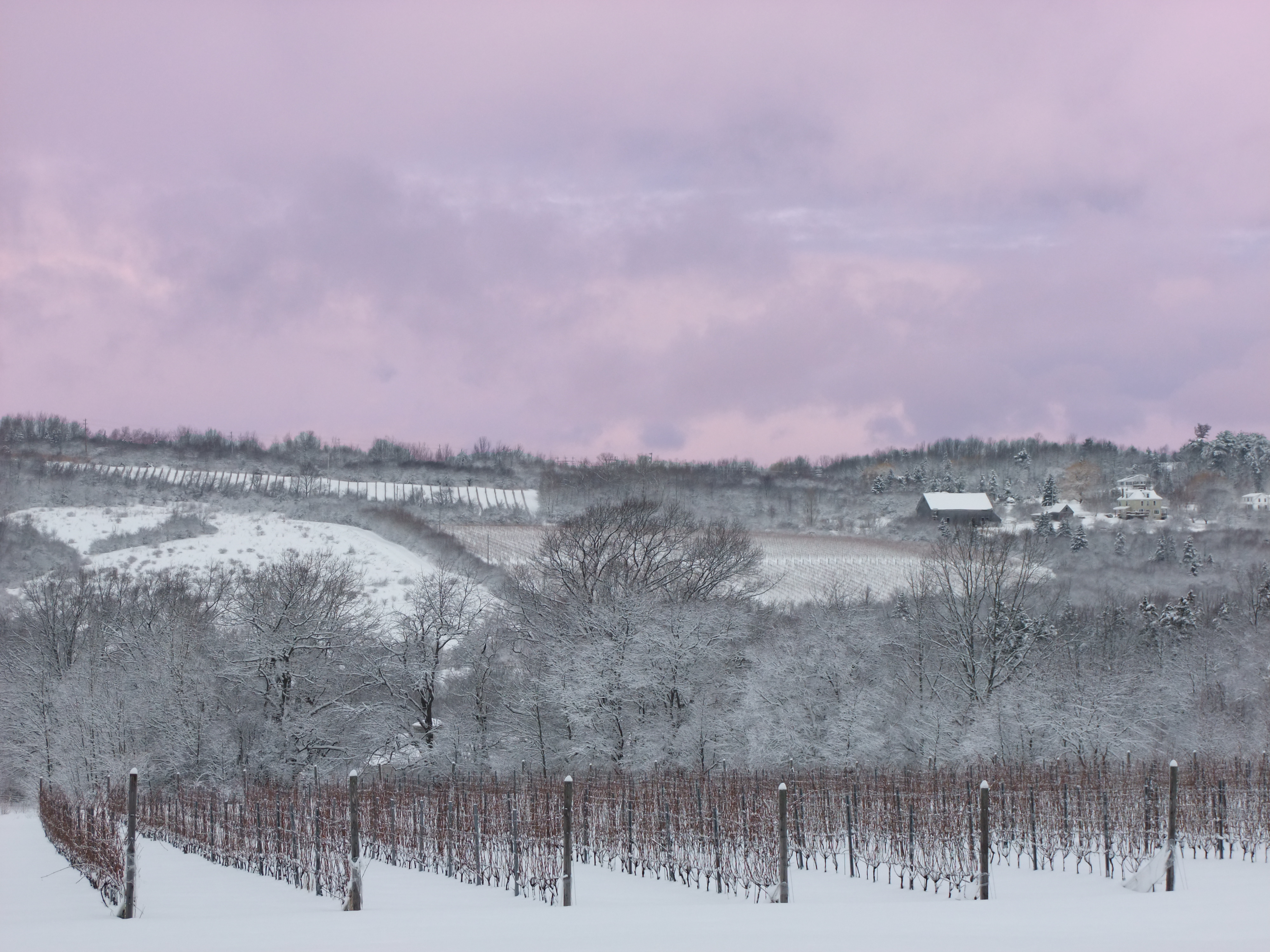
Hello everyone,
We have been busy pruning the vineyard on these incredibly beautiful (but chilly) winter days and disgorging sparkling wine in the cellar when the weather is less favourable. The new 2022 vintage wines are tasting fantastic and we can't wait to bottle and share them with you! The first wine club shipment of 2023 will be in May... Stay tuned club members: we've got some delicious new wines for you to try!
❤️ Valentine's Day Giveaway ❤️
Because we love you, we are doing an Instagram giveaway for Valentine's Day! Check out our page for your chance to win a bottle of Joie de Vivre, La Vie en Rose, 2 champagne flutes & a champagne stopper.
🥂 Wine Tasting at the NSLC 🥂
We will be at the NSLC in Wolfville on Monday, February 13th from 3pm to 7pm. Swing by for a sample (and maybe a bottle) of our 2021 La Vie en Rose!
✨ 4 Wines to Make your February Sparkle ✨
2019 Vintage Cuvee ~ Multi-national award winning dry traditional method sparkling with enhanced minerality. Silver medal and 90 points at National Wine Awards of Canada. We finished disgorging the last bin of 2019 in January. An exceptional growing year for sparkling - this one is our house favourite. Get it now before it is gone!
2019 Vintage Cuvee Rose ~ Multi-national award winning dry traditional method sparkling with bright cherry and strawberry flavours. We also recently finished disgorging this gem. We have some left at the winery...but inventories are getting low. Dangerously low. This beautiful rose is perfect for that special someone (and who is more special than yourself?)
2021 Joie de Vivre ~ Dry charmat method sparkling with bright flavours of apple, lime and citrus, and signature creamy bubbles. Thanks for the overwhelmingly positive response for this wine! Our Joie de Vivre was the first charmat method wine we released over a year ago now...it's a hit!
2021 La Vie en Rose ~ Dry charmat method sparkling with flavours of dried strawberry, cherry and lime, and signature creamy bubbles. "SUPER delicious, no surprise there! Loved the play of red fruit with savory components...So well balanced!!" Sommelier Brodie Cook commented. This one is only available at the NSLC and Port of Wines (and of course, directly through us!)
Available at Harvest Wines, Liquid Assets, Bishop's Cellar & the NSLC.
❄️ Winter Hours ❄️
Closed for the season, reason: freezin'! Although the wineshop & tasting room are closed, we can still arrange local delivery for online orders. Email info@lacadievineyards.ca for more information. Weather permitting, we can also ship wine throughout the Maritimes (and the rest of Canada once the weather warms up!) You can also find us at Harvest Wines, Liquid Assets, Bishop's Cellar & the NSLC!
Local Organic Vegan Excellence
Vineyard Update - Polar Vortex Impact
Vineyard Update - February 4 Polar Vortex Impact

On February 4 and 5 our estate Gaspereau vineyard experienced a bud-damaging cold temperature of -25C. We are still assessing the impact of the polar vortex event but preliminary bud viability analysis is indicating about 65% bud loss in our L’Acadie blocks. We haven’t assessed Chardonnay, Sauvignon blanc and Pinot Noir yet but have heard from our industry that vinifera vines were hardest hit and that it might take years for recovery. Minimum temperature and bud loss at our Gaspereau Valley location seems to be similar to other vineyards in Annapolis Valley and we are plugged into information and guidance from our Nova Scotia Grape Growers Association and researchers at the Kentville Research Centre and Perennia.
Why is there so much impact?
It is being described as a “perfect storm” for severe crop damage mainly due to the unseasonal warm January that prevented vines from reaching their normal bud hardiness. The weather event was an advective freeze with winds preventing inversion or radiative warm air. Snow cover was not enough to give any blanketing insulation effects but the hilled soil over the trunks of our vinifera vines hopefully protected them from severe trunk damage.
What is the impact on our wine production?
We are adjusting our pruning to leave more canes and buds which will hopefully give us a reasonable 2023 crop. After the 2018 spring frost, our L’Acadie blocks adjusted to the shorter growing season to ripen a small crop, and we hope it will show its suitability to our climate again. Also, our organic and vegan vineyard practices should give us a measure of resilience to climate change and we may see those benefits as the growing season progresses. Climate Change and 2022 Vintage
Inventories of tiraged aging traditional method sparkling will be impacted for future releases in much the same effect as the 2018 frost. Release of 2020 Vintage Cuvee and 2020 Vintage Cuvee Rose will continue as planned for this spring.
Our 2022 Tidal Bay production is less than previous years and we will have to allocate 2023 sales accordingly. Similarly, charmat method
Alcohol and Wine
A new report from the Canadian Centre for Substance Use and Addiction has found that any more than two drinks a week is a health risk. This is sharply reduced from the past 10-15 drinks per week guideline.
https://www.cbc.ca/news/health/alcohol-cancer-risk-warning-1.6715769
This could lead to mandatory alcohol warnings on wine bottle labels, a good step towards transparency, and has me thinking of other label declarations that would benefit consumers.
I welcome transparency much like we are transparent with our organic wine and vegan wine traceability. Consumers have a right to know where their food is from, how it was produced and, yes, health risks involved. The responsibility has always been on organic producers to prove their integrity with inspections and audits, but shouldn’t non-organic farmers be required to provide a list of carcinogenic pesticides like Round-up, a widely used herbicide, recognized by WHO (World Health Organization) as a probable carcinogen. I have worked for large wineries and was always amazed seeing the same pesticides used in the vineyard always show up on the pesticide analysis of bottled wine.
Another level of transparency for consumers in GMO labelling. Genetically modified food does not have to be declared on labels in Canada or the USA, but are required in EU.
Will this new alcohol consumption report and possible label warnings affect wine sales? Wine is different than other alcoholic beverages and it’s possible that its alignment with food, lifestyle and moderation might give it more resilience. Nova Scotia wines in particular have lower alcohols than warmer wine regions – Tidal Bay, the region’s signature white blend, must be less that 11.0 % alcohol.
Give consumers information they need and let them make wise choices.
Research on microbial terroir and its impact on wine flavour
Research on microbial terroir and its impact on wine flavour - play the video
~a collaboration with Saint Mary's University on indigenous microbe populations in our Gaspereau estate vineyard and the resulting flavour of our Pet Nat and other organic wines
SMU Clarissa Sit V2 from Saint Mary's University on Vimeo.
More blogs about our certified organic vegan vineyard:

